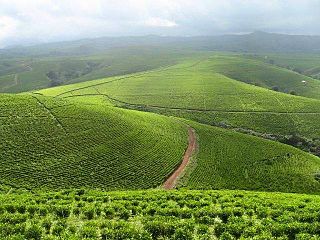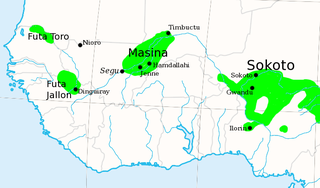
Taraba is a state in North Eastern Nigeria, named after the Taraba River, which traverses the southern part of the state. Taraba state's capital is Jalingo. The main ethnic groups are the Fulani, Tiv, Mumuye, Mambilla, Wurkuns, Jukun, Kuteb, Yandang, Ndola, Itchen, Tigun and Jibu. The northern parts is mainly dominated by Fulani of Muri emirate. The southern parts are dominated by the Jukun, Chamba, Tiv, Kuteb and Ichen.The central region is mainly occupied by the Fulani, Mambilla and the Jibu peoples. There are over 77 different tribes, and their languages in Taraba State.

Ado Bayeropronunciation CFR, LLD, JP was the Emir of Kano from 1963 to 2014.
Muri is a town and traditional emirate in Jalingo but covers Karim Lamido LGA ARDO KOLA Yoro, Taraba LGA and others, in northwestern Taraba State, eastern Nigeria, approximately between 9° and 11° 40′ E. and 7° 10′ and 9° 40′ N. The Benue River is nearby, and the portion on the southern bank of the river is watered by streams flowing from the Cameroon region to the Benue. In 1991, the town was estimated to have a population of 56,570. The valley of the Benue has a climate generally unhealthy to Europeans but there are places in the northern part of the province, such as the Fula settlement of Wase on a southern spur of the Murchison hills, where the higher altitude gives an excellent climate.

The Zazzau, also known as the Zaria Emirate, is a traditional state with headquarters in the city of Zaria, Kaduna State, Nigeria. The current emir of Zazzau is H.E Alhaji Ahmed Nuhu Bamalli CFR, who succeeded the former emir, late Alhaji Shehu Idris.

The Fulajihads sometimes called the Fulani revolution were a series of jihads that occurred across West Africa during the 18th and 19th centuries, led largely by the Muslim Fula people. The jihads and the jihad states came to an end with European colonization.
Dukku is a Local Government Area in Gombe State, Nigeria. Its headquarters are in Dukku town. The Gongola River flows through the west and north of the LGA. It has an area of 3,815 km2 and a population of 207,190 from the 2006 census. The vast majority of the population are Muslims, but there is a Christian minority. The major ethnic group is Fulani with Fulfulde being spoken as a major language alongside Bole while Hausa, Kanuri, and Kare-Kare are also spoken.
Karim Lamido is a Local Government Area in Taraba State, Nigeria. Its headquarters are in the town of Karim Lamido at 9°18′00″N11°12′00″E.
The Daura Emirate is a religious and traditional state in Northern Nigeria, the Emir of Daura still rules as a ceremonial hereditary monarch, and maintains a palace. Muhammad Bashar became the emir in 1966, reigning for 41 years until his death in 2007, On 28 February 2007, Umar Faruk Umar became Emir of Daura succeeding Muhammad Bashar.
Umaru Bago Tafida III is the 12th Emir, Etsu, or traditional ruler of Lapai in Niger State, Nigeria appointed in July 2002. He succeeded Emir Alhaji Muhammadu Kobo, who died at the age of 92 after ruling for 48 years, and was appointed to the stool by the Niger State governor Abdulkadir Kure.

The Emir of Zazzau, known as Sarkin Zazzau in Hausa is the traditional ruler based in Zaria, which was also known as Zazzau in the past. Although in centuries past, the emirs ruled as absolute monarchs, in the 20th and 21st centuries Nigerian traditional rulers hold little constitutional power, but wield considerable behind-the-scenes influence on the government. The emir's residence is in the historic palace in the town of Zaria.

The Gombe Emirate is a traditional state in Nigeria that roughly corresponds in area to the modern Gombe State.The current Emir of Gombe is Alhaji Abubakar Shehu Abubakar III, who acceded on 6 June 2014. The late Emir of Gombe, Alhaji Shehu Usman Abubakar, who precedes his father Abubakar II had been Emir since August 1984.
For the Arab Hutaymi tribe, see Sulluba

Communal conflicts in Nigeria can be divided into two broad categories:

The Dambazawa are a Fulani clan residing mainly in Kano State, Nigeria. They were among the key promoters, planners and executors of the Fulani Jihad in Kano, which took place between 1804 and 1807 under the leadership of Shehu Usuman dan Fodiyo. The clan was said to be the top financier of the jihad because it was said to be extremely wealthy at the time of the jihad. Other Fulani Clans that participated in the Jihad included: the Jobawa, the Yolawa, the Sullubawa, the Danejawa and others, as well as a contingent of the native Hausa people led by Malam Usuman bahaushe. Together they formed a formidable force and toppled the 158 year Kutumbawa dynasty led by its last ruler Muhammad Alwali dan Yaji dan Dadi bakutumbe who ruled between 1781 and 1806.
Herder–farmer conflicts in Nigeria are a series of disputes over arable land resources across Nigeria between the mostly-Muslim Fulani herders and the mostly-Christian non-Fulani farmers. The conflicts have been especially prominent in the Middle Belt since the return of democracy in 1999. More recently, they have deteriorated into attacks on farmers by Fulani herdsmen.
Naziru M Ahmadpronunciation also known as Sarkin Wakapronunciation is a Nigerian singer and songwriter. Naziru was turbaned as Sarkin Wakan Sarkin Kano in December 2018.
Shuaibu Isa Lau is a Senator of the Federal Republic of Nigeria from Taraba State. He represents Taraba North in the Nigerian 9th National Assembly. Senator Lau is the Chairman, Senate Committee on Public Procurement.
Aminu Ibrahim Daurawa also known with his honorific as Sheikh Daurawa, He is a Nigerian Islamic Scholar. Sheikh Daurawa appointed by Kano State governor Abba Kabir Yusuf in 2023 as commander of Hisbah Kano.








